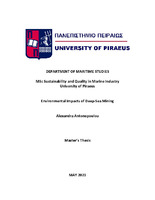Environmental impacts of deep-sea mining

Master Thesis
Συγγραφέας
Αντωνοπούλου, Αλεξάνδρα
Antonopoulou, Alexandra
Ημερομηνία
2021-05-31Επιβλέπων
Σακελλαριάδου, ΦανήΠροβολή/
Λέξεις κλειδιά
Deep seabed mining ; International Seabed Authority ; Mining Code ; Deep sea deposits ; Clarion-Clipperton Zone ; Polymetallic nodulesΠερίληψη
The urbanization, the rising of the population, the development of technology along with the elevating level of our everyday lives increase the need for mineral resources, which have multiple appliances. Until now, such deposits were found in terrestrial sites, which however, will soon expire. Therefore, the deep sea mining could be the solution to cover humanity’s needs. However, the limited knowledge on deep sea ecosystems and restricted environmental baseline information currently available are prohibiting to move towards the mining of deep-sea resources, as serious harm can be caused to the environment. As the sea has no boundaries, mining activities can have impacts in various places and users of the marine area. To date, only test mining and exploration activities have taken place worldwide, without however moving to the next phase, which is the exploitation of the available deposits.
The Authority which regulates the deep-sea area (meaning the marine area beyond national jurisdiction) is the International Seabed Authority which, via a set of regulations and various recommendations and guidelines, controls the mining activities in the deep sea. The International Seabed Authority supports that the activities should take place basis a precautionary approach, adaptive management and to conduct Environmental Impact Assessment and Environmental Management Plans, as the goal is to proceed with mining in the future, but in a sustainable manner, to protect the deep sea environment for our sake and the generations to come.
Through studying the case of Clarion- Clipperton Fracture Zone, one of the areas with growing interest for its mining due to high concentration in polymetallic nodules, it has become apparent that the scientific knowledge is still limited, and it is the needful factor to address environmental thresholds in order to proceed with the mining phase. By raising scientific knowledge, and understanding the ecosystems and their connectivity, the environmental thresholds can be managed and understood, in order to avoid irreversible environmental harm.

